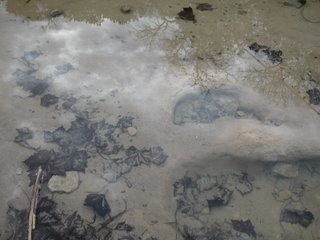
I remember vividly how thrilled I was at the sight of the massive demonstrations last March in Beirut. At the same time, as a Syrian, I also sensed that the passionate, red hot nationalism manifested during those demonstrations was bound to spill over into xenophobic excess (understandable, perhaps, but still inexcusable). Yet the sight of a million Lebanese, about a quarter of the country's population, spontaneously making their voices heard was unprecedented in Lebanon or anywhere in the Middle East and the prospects of what that meant for the region made me giddy with anticipation. This demonstration of the power of ordinary people, I thought optimistically, not the 150,000 US troops in Iraq will change the face of the region for the better. Lebanon, was perhaps the only place in the region where such a demonstration of people power could have been mounted. The reasons are many: an educated, politically, culturally and religiously diverse citizenry, an essentially free press and recent experience with the ravages of civil strife. In contrast to the monochromatic public discourse in most Arab countries, the Lebanese were routinely exposed to contrarian views that challenged what passed as conventional wisdom in most of the region. Add thirty years of occupation and the Lebanese people were primed. But, in hindsight, the most important factor in this rare demonstration of Lebanese unity, and perhaps the reason it was unsustainable, was that the perceived enemy was foreign.
Some skeptics may dispute the fact that these demonstrations were spontaneous. I disagree. The powers that be with their inbred leaderships, their sectarian outlooks, and their cynical political machinations were incapable of imagining such a powerful response to the murder of Hariri. Once they realized the potential power of the movement, they co-opted it (Hijacked, in the words of the
Grateful Arab). Following the pullout of the Syrian troops, the unity of people power, was promptly replaced by the old, narrow-minded preoccupations of the established parties. They spoke of the lofty ideals of Lebanes unity in public but practiced their old worn game of sectarian politics behind closed doors. There were no new faces just the same old names of recycled politicians, some -ultimate opportunists- thinking nothing of making an about face in their political persuasions. Many Lebanese continue to blame the Syrians for the present impasse; that argument is wearing thin a year after the pullout of Syrian troops. Syria's proxies (Lahoud and Hezbollah) certainly contributed heavily to the present stalemate but rather than doing Syria's bidding, they were trying to maintain their own power and push their agendas (Although I am not sure Lahoud has an agenda).
The ultimate success of the Cedar revolution will rest on its ability to force Lahoud out before the end of his term. This is vitally important not only for Lebanon but as a precedent setting event for the whole region. The ouster of Lahoud will embolden the Syrian opposition and perhaps shake the cowed people of Syria into action. Unfortunately, a year out, I fear that much the Cedar revolution's momentum has been dissipated.
I hope I am proven wrong.
(Watercolor, Yas., age 7)

